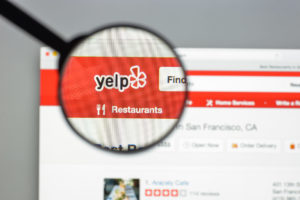In This Post:
- Summary of Yelp defamation case;
- Discussion about how to win a Yelp reputation case;
- Contact information for an online defamation attorney;
Another Yelp defamation case made headlines. In the latest installment of “Law and Order: Online Reputation Unit,” a California auto dealer is suing a client over a disparaging Yelp review.
Yelp Defamation Case Study: Business v. Reviewer
The Basics
Plaintiff: Zeibak Auto Trading
Defendant: Zaki Ibrahim
Lawsuit Catalyst: Ibrahim bought a used car for his wife at Zeibak Auto Trading. According to an ABC News report, the car gave him problems after he drove it off the lot. So, according to Ibrahim, he returned to Zebiak’s with hopes of calmly discussing the matter. Allegedly, while there, staff ignored Ibrahim. Upset about the poor service, Ibrahim posted a negative review on Zebiak’s Yelp page, outlining the purported incident. In the words of Mr. Ibrahim:
“I described the experience as being a nightmare to say the least, and especially since I tried from my end to resolve the matter amicably.”
Who Will Most Likely Win This Yelp Reputation Case?
Few case details have made their way to the press, so it’s impossible to do a full – and fair – analysis. But what we can do is take a look at the basic requirements for winning an online defamation lawsuit in the United States, in relation to the facts of this Yelp reputation case.
What Constitutes Legal Defamation?
To win a slander (spoken defamation) or libel (written defamation) lawsuit in the United States, plaintiffs must, at the very least, satisfy four legal elements.
- Identity: The first thing defamation plaintiffs must prove is that the contested statements are about them. Slander and libel lawsuits are lost because the claimants fail to prove that the defendants were talking about them.
- Falsity: Due to the First Amendment and established case law, pure opinion and truth generally aren’t defamatory in a U.S. court of law. Plaintiffs almost always have to prove that their respective defendants made false and unprivileged statements of fact.
- Harm: Except for defamation per se cases, nearly all defamation plaintiffs must prove that the contested statement(s) caused them either material or reputational harm.
- Negligence: Plaintiffs must also demonstrate that the defendant acted negligently by publishing, speaking, or otherwise broadcasting the contested statement.
Mr. Ibrahim told ABC7 Los Angeles that he is ready to fight this Yelp defamation lawsuit, admonishing the auto dealer for “essentially trying to sue their customers into silence.”
In U.S. Defamation Cases, Plaintiffs Must Prove The Defendants Lied
Unless the auto dealer can somehow prove that Mr. Ibrahim is lying, this lawsuit probably won’t go far. Why? Because under United States defamation law, it’s the responsibility of the plaintiff to prove that the defendant made an unprivileged, negligent, false statement of fact. In the context of this Yelp defamation case, Zeibak would need to demonstrate that Ibrahim’s visit didn’t unfold as he described, which – who knows – may be the case. We’ll just have to wait to see how this all turns out.
Got Questions? Speak With A Yelp Defamation Attorney
In the meantime, if you’re in search of a Yelp defamation lawyer to review a situation, get in touch with Kelly / Warner. Our attorneys have helped countless individuals and businesses with various online reputation matters and our track record speaks for itself.
To learn more about Kelly / Warner Law, please click here. If you’re ready to set up a consultation, please head here to schedule an appointment – we look forward to speaking with you soon.

Leave a Reply
Your email is safe with us.